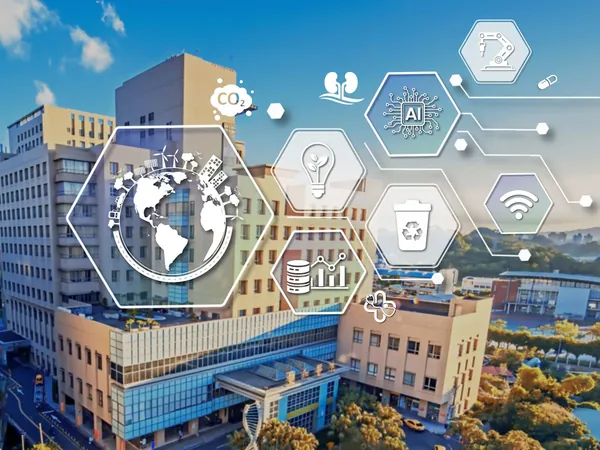
Taiwan's Bold Move: The First Net-Zero Kidney Care Center
2025-09-22
Author: Wei
Revolutionizing Kidney Care for a Sustainable Future
In a groundbreaking initiative, Taiwan is setting a global precedent by proposing the world's first Net-Zero Emissions Kidney Care Center. This ambitious endeavor aims to transform nephrology practices to align with the United Nations’ goal of achieving net-zero carbon emissions by 2050.
What is Green Nephrology?
At the heart of this initiative is the concept of Green Nephrology, which seeks to minimize the ecological impact of kidney care. Traditional dialysis is carbon-heavy, consuming vast amounts of energy, water, and materials. By reimagining kidney care through sustainable practices, Taiwan aims to ensure high-quality patient outcomes while drastically reducing the environmental footprint.
Taiwan's Commitment to Sustainability
In line with its commitment to climate action, Taiwan announced a roadmap for net-zero emissions by 2050, culminating in the 2023 enactment of the Climate Change Adaptation Act. This legislative move sets the stage for incorporating sustainable practices into the health care sector, particularly nephrology.
The Global Context: Health Care and Climate Change
Countries worldwide are beginning to recognize the health sector's significant role in combating climate change. For instance, the UK has embarked on a journey to make its National Health Service the first net-zero healthcare system globally, while the US has established the Office of Climate Change and Health Equity to drive the transition to sustainable practices.
The Saving Potential of Green Nephrology
Studies have shown that enhancing sustainability in nephrology can lead to substantial cost savings. The NHS in the UK projected savings of over a billion dollars from green strategies, while similar initiatives in France showcased marked reductions in energy and water consumption without sacrificing care quality.
Taiwan's Unique Challenge
With the highest per-capita dialysis use in the world, Taiwan faces significant challenges. In 2021, the country reported a staggering incidence rate of 522 per million individuals requiring dialysis, imposing a financial burden on its National Health Insurance system. The aging population coupled with increasing health demands necessitates immediate action.
A Comprehensive Framework for Action
The proposed model at Shuang Ho Hospital in Taipei adheres to the UN Framework Convention on Climate Change's guidelines for net-zero emissions. It aims to create a user-friendly transition framework that can be replicated by other health institutions, balancing quality patient care with environmental sustainability.
Key Strategies: Driving Change in Kidney Care
1. **Digital Transformation**: Implementing advanced health information systems to optimize resource management. 2. **Low-Carbon Approaches**: Promoting kidney transplants over dialysis, as each successful transplant can eliminate up to 3.6 tons of CO2 emissions annually per patient. 3. **Circular Economy Models**: Reducing waste through recycling initiatives, repurposing materials, and optimizing water usage. 4. **Preventive Medicine**: Focusing on disease prevention to minimize the need for dialysis and improve patient outcomes.
Community Engagement and Education
Educational initiatives are fundamental to this transition. The center will engage patients in sustainable health practices while collaborating with local organizations to expand kidney health education to underserved communities.
Leading the Way
Taiwan's vision of a net-zero emissions kidney care center is not just about reducing carbon footprints; it's about rethinking health care delivery to ensure that sustainability and patient care go hand in hand. As the world grapples with climate change, Taiwan's model could very well serve as a blueprint for health care systems globally.


 Brasil (PT)
Brasil (PT)
 Canada (EN)
Canada (EN)
 Chile (ES)
Chile (ES)
 Česko (CS)
Česko (CS)
 대한민국 (KO)
대한민국 (KO)
 España (ES)
España (ES)
 France (FR)
France (FR)
 Hong Kong (EN)
Hong Kong (EN)
 Italia (IT)
Italia (IT)
 日本 (JA)
日本 (JA)
 Magyarország (HU)
Magyarország (HU)
 Norge (NO)
Norge (NO)
 Polska (PL)
Polska (PL)
 Schweiz (DE)
Schweiz (DE)
 Singapore (EN)
Singapore (EN)
 Sverige (SV)
Sverige (SV)
 Suomi (FI)
Suomi (FI)
 Türkiye (TR)
Türkiye (TR)
 الإمارات العربية المتحدة (AR)
الإمارات العربية المتحدة (AR)